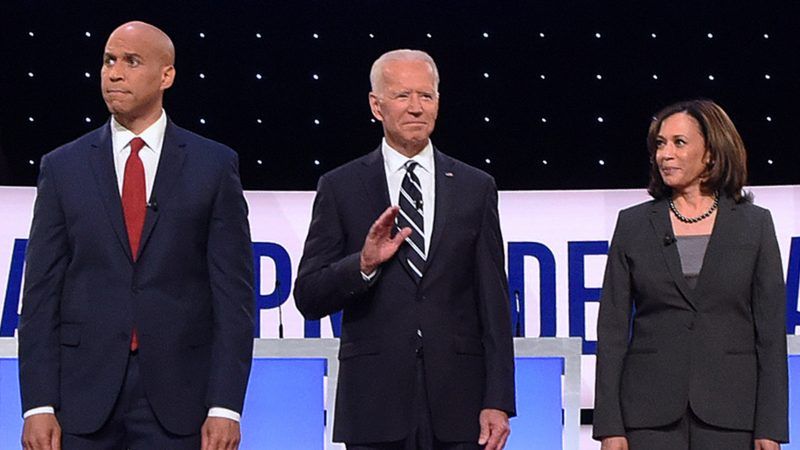The Democratic Debates Will Alienate Democratic Voters
The progressive push to the left among presidential candidates will alienate most Democrats and independents, helping Donald Trump to a second term.

This week's Democratic debates have gone a long way toward betraying the expressed interests of Democratic Party voters. That's because they were a showcase for, in the words of countless news outlets, "progressives vs. moderates," with the progressives always holding the moral and ethical high ground, despite the fact that the majority of Democratic voters say they prefer far more moderate policies.
Pity poor former Rep. John Delaney (D–Md.) for pointing out, correctly, that Sens. Elizabeth Warren's (D–Mass.) and Bernie Sanders' (D–Vt.) versions of Medicare for All comprise an "anti-private sector strategy" built on "impossible promises" and "fairy-tale economics," including the end of non-government medical care.
Sure, Medicare for All might be a political suicide mission but Warren, to great applause in the debate and after, shot back:
I don't understand why anybody goes to all the trouble of running for president of the United States just to talk about what we really can't do and shouldn't fight for.
That sort of back-and-forth sums up the tenor of the debates. Delaney is largely correct in saying Medicare for All plans that prohibit private insurance will be too expensive to implement. Rep. Tim Ryan (D–Ohio) is also correct that such plans will be attacked by union members who stand to lose gold-plated private health insurance their leadership fought hard to win. But progressives are the crazy, idealistic dreamers who aren't going to sit around and be hemmed in by basic laws of political physics. Like Rep. Alexandria Ocasio-Cortez (D–N.Y.), Sanders, Warren, and others simply exclaim, "You just pay for it."
The problem for the Democrats is pretty simple: Contrary to media narratives and debate-stage dynamics, very few members of the party are actually progressive. As CNN analyst Harry Enten writes,
Moderates and conservatives make up about 50% of all Democrats. In the 2018 midterms, the exit polls found that moderates and conservatives made up 54% of those who voted Democratic. Pew similarly put moderate and conservative Democrats as 54% of all self-identified Democrats and independents who lean Democratic voters in 2018. Gallup's 2018 figures had moderates as 47% of all adults who self-identified as Democrats.
And what about Democrats who self-identify as liberal? Enten continues:
While liberals make up about 50% of Democrats, many of them are only "somewhat liberal." In a Quinnipiac University poll taken last month, people who identified as "very liberal" were only 19% of all Democrats and independents who leaned Democratic. Very liberals made up the same 19% of those who said they were voting Democratic in Suffolk University's final 2018 pre-election poll. The 2016 primary exit polls discovered that about 25% of Democratic primary voters called themselves very liberal.
Put another way: the moderate/conservative wing of the Democratic Party likely still makes up at least 2 times as much of the party's voters than the very liberal flank.
That helps explain surveys finding that 54 percent of Democrats want a more moderate party while just 41 percent want one that is more liberal. To the extent that Democratic presidential candidates tack further and further to the left—and most of them are—they will only be alienating the rank and file of their own party, not to mention independents and other voters who still predominantly identify as conservative or moderate. That's a clear advantage for President Donald Trump, who can brag about a strong economy while kicking dirt over his stubbornly low approval ratings and racist tweets.
For those of us who aren't members of the Democratic Party, there's a bigger issue still: The framing of the current Democratic race as between progressives and moderates is deeply misleading when it comes to accurately describing the presidential hopefuls, all of whom are calling for massive expansions in the size, scope, and spending of government. In the first debate of this week, South Bend Mayor Pete Buttigieg made a plea for pragmatic solutions that aren't discussed in ideological terms:
It's time to stop worrying about what the Republicans will say. Look, if it's true that if we embrace a far-left agenda, they're going to say we're a bunch of crazy socialists. If we embrace a conservative agenda, you know what they're going to do? They're going to say we're a bunch of crazy socialists. So let's just stand up for the right policy, go out there and defend it.
Along with characters such as Delaney and former Vice President Joe Biden, Buttigieg is considered a moderate because he has criticized identity politics and "free college for all" plans. Yet he also backs national service, packing the Supreme Court with extra justices, doubling the number of unionized workers in the gig economy, and pushing broad new gun control laws. That's no more moderate than Joe Biden's calls to massively expand Obamacare (it's worth remembering, too, that Barack Obama was nobody's idea of a tightwad when it came to spending).
The conventional wisdom is that candidates take extreme positions in primaries to appeal to the activists who dominate such proceedings. Then, the candidates move to the center for the general election. But sometimes there's no coming back from the fringes. At this early stage of the Democratic presidential race, the majority of candidates are already way, way out there, and there are plenty of activists and strategists who aim to keep them well beyond anything resembling the center. But the net effect of Dems embracing causes such as the elimination of private health insurance, taxpayer-funded health care for illegal immigrants, a Green New Deal that aims to radically transform the U.S. economy in a few years' time, and reparations for both African Americans and gay couples may well be to make Donald Trump and Republicans seem less extreme when it comes to their own nutjob positions.


Show Comments (62)